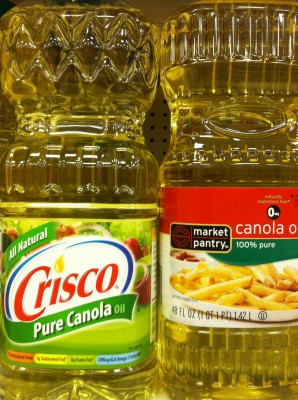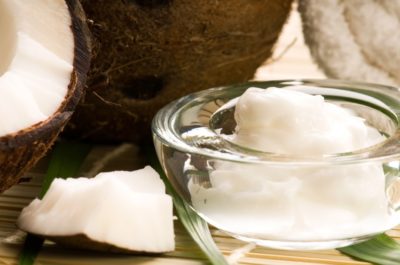 Are you confused about which type of oil is really healthy and how it should be used? If so, you are not unlike millions of other Americans who feel like they have been doing the right thing all along by choosing oils and foods labelled “heart healthy” while staying clear of those that potentially cause heart disease and other illnesses.
Are you confused about which type of oil is really healthy and how it should be used? If so, you are not unlike millions of other Americans who feel like they have been doing the right thing all along by choosing oils and foods labelled “heart healthy” while staying clear of those that potentially cause heart disease and other illnesses.
Truth: Food manufacturers have pulled yet another fast one on consumers by marketing their synthetic products as everything from “natural” to “healthy” — touting that they reduce cholesterol and blood pressure, while improving overall health.
However, science doesn’t even come close to backing up any of the expressed claims, and when one looks below the surface, they see quite a different story about what type of oils really are truly healthy and which ones we should avoid at all costs.
Let’s take a look at four “healthy” oils and see just what they are made of — perhaps this will change your thinking.
1. Cottonseed Oil
Many common products found in your local supermarket such as chips, canned foods and other packaged goods contain cottonseed oil. The main issue with cottonseed oil, however, is that it does not come from a food crop. Cotton is an industrial group and treated as such. There are no rules as to what can be sprayed on cotton crops and the lack of any regulations puts consumers at great risk. Chemicals such as propargite, naled, dicofol, cyanide and trifluralin are applied to the crop and seep into the plants — virtually turning them into toxic material. Because of this and the high amount of omega-6 fatty acid and the use of genetically modified seed that cottonseed oil contains, it is a very poor choice for the kitchen.
2. Soybean Oil
Advertisers have conveyed to us for years that soybeans are amazing for our health. While this is true of fermented organic soybeans, the same can in no way be said of the American soybean or soybean oil. Over 90 percent of all soybeans grown here are genetically modified and highly processed.
New Survival Seed Bank™ Lets You Plant A Full Acre Crisis Garden!
Research has demonstrated that unfermented soy can disrupt the thyroid and hormones because it contains estrogen-like compounds known as phytoestrogens. The sad truth is that almost 80% of all oil consumed today is soybean oil.
3. Safflower Oil
You may have heard that if you want to drop your cholesterol you should be using safflower oil. However, like cottonseed oil, safflower oil is very high in omega-6 fatty acids. Research clearly demonstrates that not enough omega-3 and way too much omega-6 is making us very sick. For a very long time, the human diet was rich in omega-3 fatty acids found in seafood but low in omega-6 seed oils. In these cultures, modern conditions caused by inflammation such as heart disease, cancer and diabetes were rare – but today they are leading causes of death.
With the onset of the industrial revolution our diet became heavy in omega-6 fatty acids due to the modern vegetable oil industry and the increased use of cereal grains to feed domestic livestock which changed the fatty acid profile of meat.
What is wrong with too much omega-6?
Researchers who used to say that cholesterol kills are now pointing a finger directly at omega-6 fatty acids — once considered “heart healthy.”
Today the ratio of omega-6 fatty acids to omega-3 fatty acids has changed from 1:1 to as much as 20-25:1. In the body, omega-6 competes with omega-3 for the same conversion enzyme — with a higher quantity of omega-6 fatty acid — omega-3 fatty acid cannot be converted into forms necessary to protect us from illness.
4. Canola Oil
Canola oil does not exist in nature; there is no such thing as a canola plant – it is actually a hybrid version of a rapeseed plant. The rape plant is in the same family as the mustard and is an industrial plant that contains cyanide compounds. Wild animals will not even touch it — what does that say?
 Canola, 90 percent of which is genetically modified, is actually a made-up name which stands for Canadian oil low acid.” The name was given to the product to give it a more positive spin for marketing. The oil has been used to make candles, soaps, lubricants, inks, lipstick and even biofuel.
Canola, 90 percent of which is genetically modified, is actually a made-up name which stands for Canadian oil low acid.” The name was given to the product to give it a more positive spin for marketing. The oil has been used to make candles, soaps, lubricants, inks, lipstick and even biofuel.
During the refining process, the plant is exposed to high heat which destroys the omega-3 heath promoting fatty acids and is also deodorized and bleached. Afterwards, it is sprayed with more chemicals to change the color, remove the odor and make it palatable.
If the oil is going to be used for shortening or margarine it goes through the hydrogenation process to make it solid at room temperature. At this point, dangerous trans fats are created.
In the journal Epidemiology a published study called “Margarine Intake and Subsequent Coronary Heart Disease in Men” followed participants of the Farmingham Heart Study for 20 years and noted the incidence of heart attack along with butter and margarine consumption. The study revealed that as margarine consumption went up so did heart attacks – conversely, as butter consumption increased, heart attacks declined.
The bitter truth
The vegetable oils listed above contain dangerous chemicals including pesticides and are hyper-processed. In addition, most vegetable oils contain BHT (Butylated Hydroxyanisole and Butylated Hydroxytolune) which are artificial antioxidants to keep them from spoiling too fast. These chemicals have been linked to producing cancer-causing compounds in the body and are linked to liver/kidney damage, infertility, high cholesterol, behavioral problems and immune system problems. Excess consumption of vegetable oils also disrupts hormone production — hormones need fats and vegetable oils don’t provide what they need.
Synthetic oils to avoid
Here is a list of all the types of oil you should avoid at all costs – including the ones listed above:
Corn oil
“Vegetable oil”
Peanut oil
Margarine
Shortening
Canola oil
Soybean oil
Sunflower oil
Safflower Oil
Grapeseed oil
Any other fake butter or vegetable oil product
There is no nutritional need for synthetic oils. The good news is that there are plenty of healthy natural fats to be found. However, avoiding the dangerous oils does not mean just not cooking with them — you have to be very careful of any number of processed foods that may contain them, such as:
Salad dressings
Condiments
Chips
Fake cheese
Cookies
Fast food
Crackers
Packaged snack foods
Sauces
But there’s good news!
The good news is that there is one incredibly healthy natural oil that can replace all of the other dangerous oils. An oil that has been used for thousands of years and has powerful medicinal properties as well as a great taste!
 Coconut oil. Perhaps the king of healthy fats, coconut oil has been raked over the coals as a saturated fat that can cause tremendous health problems. Yes, coconut oil is a saturated fat — but it is the shining star of saturated fats containing medium chain fatty acids and lauric acid.
Coconut oil. Perhaps the king of healthy fats, coconut oil has been raked over the coals as a saturated fat that can cause tremendous health problems. Yes, coconut oil is a saturated fat — but it is the shining star of saturated fats containing medium chain fatty acids and lauric acid.
Used by the Pacific Islanders for thousands of years, coconut oil is now being called a superfood and truly deserves this distinction. The unique properties of raw organic coconut oil help to improve digestion, brain health, kill bacteria, regulate blood sugar and boost metabolism.
Unlike seed oils that are long chain fatty acids (LCFA), coconut oil is a medium chain fatty acid (MCFA). LFCA are very hard for the body to break down and they put a tremendous strain on the pancreas, liver and digestive system. In addition, LCFA are stored as fat and can be deposited in the arteries in a lipid form such as cholesterol. In comparison, MCFAs break through cell membranes easy and can be used for energy. Because they require minimal effort for digestion, they put very little strain on the digestive system. In addition, MCFA’s are sent directly to the liver where they are immediately converted into energy as opposed to being stored.
A growing body of research demonstrates that people who consumer organic raw coconut oil on a daily basis do not suffer from the western diseases so popular in our culture. Use coconut oil to replace all of your other kitchen oils – you can fry with it, bake with it and even use it to moisturize your skin and hair. There is really no shortage of ways that you can incorporate healthy, natural coconut oil into your diet. So, say goodbye to refined seed oils that may be harming your health and welcome a new oil into your life today. Your body will thank you.
Note: Always purchase organic raw virgin coconut oil – it will have a slightly tropical aroma and will remain solid at room temperature.
Sign up for Off The Grid News’ weekly email and stay informed about the issues important to you
 Off The Grid News Better Ideas For Off The Grid Living
Off The Grid News Better Ideas For Off The Grid Living




